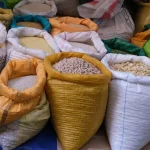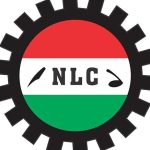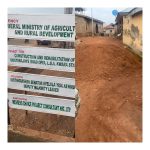In the market of Osogbo, pepper sellers confront the harsh realities of economic hardship with unwavering determination.
Despite facing formidable challenges, these vendors persevere, finding ways to thrive amidst adversity.
The impact of soaring prices reverberates throughout the pepper selling business, as newcomers like Mrs.
A seller, Gift Denis grapples with the harsh realities of maintaining profitability in a volatile market.
“The high cost of things has made the profit go down,” she lamented, highlighting the precarious balance between maintaining profitability and sustaining customer demand.
Weathering the Storm: The Impact of Economic Hardship on Nigerian Businesses
Against the backdrop of economic hardship, Nigerian businesses grapple with the repercussions of policy decisions and environmental factors.
The removal of fuel subsidies has exacerbated existing challenges, leaving entrepreneurs to navigate a landscape fraught with uncertainty.
Nigeria, the most populous country in Africa, has a diverse economy with agriculture, petroleum, and telecommunications playing significant roles.
Despite its economic potential, the country faces various challenges, including political instability, corruption, and inadequate infrastructure.
The Nigerian economy has experienced periods of growth and recession, with the recent economic downturn atributed to factors such as the decline in oil prices, the COVID-19 pandemic, and policy uncertainties.
The removal of fuel subsidies and currency devaluations have also impacted businesses, particularly small and medium enterprises (SMEs).
According to the National Bureau of Statistics (NBS), Nigeria’s inflation rate has been on the rise, reaching a four-year high in 2021. This has led to an increase in the cost of living, affecting businesses and consumers alike. The NBS also reports that unemployment rates have been high, particularly among youth and women, further exacerbating the economic challenges faced by the country.
Legacy of Resilience
Despite the mounting pressures of economic turmoil, the sellers remain steadfast, relying on their perseverance to weather the storm.
There is no gain at all,” asserted Mrs. Serifat Mudashiru, her voice tinged with frustration as she described the challenges of stagnant sales and mounting debts. Despite these hardships, Mrs. Mudashiru’s resilience serves as a testament to the enduring spirit of Nigerian entrepreneurs, who continue to forge ahead in the face of adversity.
Reflecting on the current economic climate, Mrs. Mudashiru expressed, “The market is tough, and competition is fierce. It’s not easy to make a profit when prices are constantly rising, and customers are tightening their belts.”
She highlighted the impact of inflation on her business, stating, “What used to be affordable for my customers is now considered a luxury. People are cutting back on non-essential items, and that directly affects my sales.”
Despite these challenges, Mrs. Mudashiru remains undeterred, stating, “I have to keep going. This business is all I have, and I must make it work for the sake of my family.”
She emphasized the importance of resilience in entrepreneurship, stating, “You have to be strong-willed to survive in this business. There are days when sales are slow, and bills are piling up, but you have to keep pushing forward.”
Mrs. Mudashiru also highlighted the need for government support, stating, “The government should provide more assistance to small businesses like mine. Access to affordable credit and business training programs would go a long way in helping us succeed.”
Despite the challenges she faces, Mrs. Mudashiru remains hopeful for the future, stating, “I believe that things will get better.
I will continue to work hard and persevere, knowing that my efforts will eventually pay off.”
Faith Amid Uncertainty
For many, faith serves as a guiding light amidst uncertainty. “Everything is in the hands of God,” proclaims Mrs. Arewa Akinsola, her unwavering faith shining through as she acknowledges the challenges that lie ahead in her entrepreneurial journey. 
Yet, despite the hurdles and uncertainties, she remains hopeful, trusting in divine providence to see her through the trials of her trade.
Mrs. Akinsola’s steadfast belief underscores the resilience and fortitude of Nigerian entrepreneurs, who draw strength and inspiration from their faith in times of hardship.
In the face of adversity, she stands firm, knowing that her unwavering trust in a higher power will guide her through the darkest of times and lead them to brighter days ahead.
Mrs. Rasheedat Rasheed, emphasized the need for collective action in the face of adversity.
Despite the hurdles she faces, she remains united in her pursuit of prosperity.
Her collective resilience and determination serve as a beacon of hope in turbulent times.
Policy Changes and Economic Impact
Mrs. Mudashiru vividly recalls the difficulties she encounters amidst the ever-changing economic landscape. “Before everything became dry in early 2023, I used to go to the farm with other farmers to collect plenty of banga (palm fruits),” she reminisces, her voice tinged with nostalgia.
This poignant reflection encapsulates the profound impact of economic adversities on consumer behavior and market dynamics. It serves as a stark reminder of the interconnectedness of various economic factors and their cascading effects on businesses like hers.
Mrs. Mudashiru’s recollection underscores the pressing need for sustainable solutions to address systemic issues plaguing the business environment.
As she navigates through the challenges of dwindling resources and shifting market trends, she remains steadfast in her pursuit of resilience and adaptation, embodying the indomitable spirit of Nigerian entrepreneurs.
Expert React
Isioma Faustina Odita, the Program Lead of Coronada Foundation, is a staunch advocate for women entrepreneurs, emphasizing the need for tailored government support.
“Local businesswomen can be empowered through various initiatives such as providing access to funding and grants specifically designed for women entrepreneurs, offering comprehensive training and mentorship programs, facilitating networking opportunities, and ensuring equal access to government contracts and procurement opportunities,” Isioma asserts, her voice brimming with conviction.
Despite notable progress, Isioma acknowledges persistent disparities. “Women encounter hurdles such as limited access to capital, gender bias in business financing, and unequal access to networks and mentorship,” she laments. “Policies aimed at promoting gender equality and delivering targeted support for women entrepreneurs are indispensable to ensure equitable opportunities.”
While acknowledging governmental efforts, Isioma underscores the need for continuous improvement. “There is always room for enhancement,” she emphasizes. “To further empower local businesswomen, the government could explore avenues to bolster access to finance, enhance the provision of business support services, and champion gender equality in procurement processes.”













